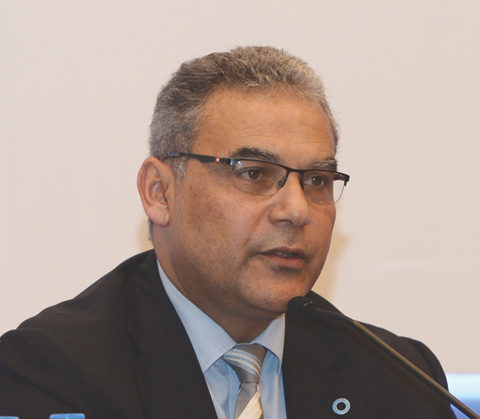 Dr Mohamed Hassanein, Chairman of Diabetes & Ramadan International Alliance
Dr Mohamed Hassanein, Chairman of Diabetes & Ramadan International AllianceKUWAIT CITY: Continuing efforts to advance diabetes management strategies during Ramadan in the region, the Diabetes & Ramadan International Alliance in partnership with International Diabetes Federation (IDF) and the Gulf Group for the Study of Diabetes, convened for the 5thDAR International Alliance congress, with the support of an unrestricted educational grant from Sanofi. A cornerstone of Ramadan diabetes management is patient education, and experts emphasized the crucial role of pre-Ramadan counseling by HCPs to reduce health risks associated with fasting, backed by clinical evidence and research presented from various countries.
"Last year, we released the 'Guidelines on Diabetes Management during Ramadan', to provide a universal direction for all those involved in working with patients. This year, the consolidated review of our work was published in Elsevier's 'Diabetes Research and Clinical Practice' medical journal; a first of its kind article that provides evidence based strategies to enhance the management of Diabetes during Ramadan. Our long term goal is to bring about a progressive behavior change among fasting patients and communities," said Dr Mohamed Hassanein, Chairman of Diabetes & Ramadan International Alliance, Consultant in Endocrinology.
Backing up with research
A large amount of research was presented to back up the guidelines published last year. Experts discussed the bio-chemical (cholesterol, kidney function, glucose control) and bio-metric (blood pressure and weight) changes that take place in the body during the Ramadan fasting period. Studies demonstrated how there was no significant change in a patients' overall health, with a marginal improvement in blood pressure, when diabetes is managed effectively.
However, this information cannot be generalized, as some patients can improve in health, while some might get worse. A high emphasis was placed on the importance of consulting with a doctor to work on an individual's personal interest and medical history, and prescribe the best course of treatment and action. A study presented by Dr Fatheya Alawadi, Head of the Endocrine Department, Dubai Hospital on 'Attitudes and behavior of people with Diabetes during Ramadan', highlighted how patients benefited from proper pre-Ramadan education and counseling.
During Ramadan, there is a dramatic change in eating patterns compared with other months of the year. Dietary recommendations need to be individualized and tailored to patients' lifestyle requirements, age, and other medical needs. This makes dietary advice critically important in the pre-Ramadan assessment. Accordingly, the DAR International Alliance has developed the Ramadan Nutrition Plan (RNP), a web-based tool designed to help HCPs in delivering patient-specific medical nutrition therapy (MNT) during Ramadan fasting.
Cultural and regional differences can make it challenging for HCPs to deliver individualized patient-applicable dietary advice. To assist in this regard, the RNP includes meal plans for different countries and in different languages. Meal plans are categorized in several daily caloric targets. This may aid HCPs and patients to plan daily meals with the aim of maintaining body weight if they are lean, or reducing body weight if they are overweight or obese. The RNP has been adopted for use in many countries and it may allow patients with limited access to HCPs to construct a healthy eating plan for Ramadan.
High risk patients
"A lack of knowledge and awareness on safe fasting measures for diabetics mean advice and guidance provided by HCPs may be inadequate, especially in Muslim-minority countries. For example, in a survey of HCPs in the US, only one-third of physicians actively enquired whether their Muslim patients intended to fast during Ramadan, and many did not feel comfortable managing these patients. Embracing and utilizing advances in technology may be one way to improve accessibility to information about management of diabetes during Ramadan, especially for people in remote regions," said Prof Adel Al Sayed, Chair of the IDF MENA Region.
"Patients from high risk groups include - Type I Diabetes patients, Type II patients on insulin therapy, pregnant woman with gestational diabetes and patients with kidney disease. People need to understand that they are not obligated to fast, if they are high risk patients. If they wish to fast, it is their responsibility to identify their own level of risk, and try to address all possible measures to minimize the risk in consultation with their physician. This includes - the choice of treatment, the timing of treatment, the dose during Ramadan, when to monitor blood glucose levels, frequency of monitoring, and most importantly, to accept the possibility of breaking the fast, as soon as the person notices that his or her glucose level is too low or too high, even if they do not feel the symptoms," added Dr. Mohamed Hassanein.
"Structured diabetes education is all about giving patients the knowledge to make informed decisions regarding their behavior and enabling them to effectively self-manage their condition. Several barriers to guideline implementation originate within the individual (the patient or HCP) or within the wider cultures of the community or healthcare system. Key solutions to overcoming such barriers include raising awareness on issues surrounding diabetes, giving proper direction on religious tenets, and providing effective, socio-culturally sensitive patient education. Following a highly individualized management plan and close follow-up is an essential approach to avoid development of health complications among patients," expressed Dr Monira Al Arouj, Consultant Diabetologist, Dasman Diabetes Institute, Kuwait.
"At Sanofi, we hope to sustain all efforts to support the Diabetes & Ramadan International Alliance in partnership with IDF and Emirates Diabetes Society, towards ensuring that we all can collaboratively identify and address challenges associated with management of diabetes during Ramadan. We recognize the need for continued scientific research in this area to build up practical experiences that will in turn lead to significant positive health outcomes for people globally," said Jean-Paul Scheuer, Country Chair& General Manager, Sanofi Gulf.










